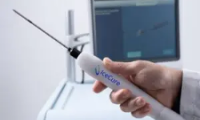-
A “dark horse” has emerged in breast cancer treatment
- Source: drugdu
- 36
- November 19, 2024
-
Computational Tool Integrates Transcriptomic Data for Improved Breast Cancer Diagnosis and Treatment
- Source: drugdu
- 77
- July 24, 2024
-
Hengrui Pharmaceuticals’ Innovative Drug Dalsili, HRS-1358 Combination for Breast Cancer Approved for Clinical Trial
- Source: drugdu
- 81
- July 24, 2024
-
ICL granted £150,000 to explore link between breast cancer and breastfeeding
- Source: drugdu
- 70
- July 3, 2024
-
New AI-System Detects Breast Cancer with Almost 100% Accuracy
- Source: drugdu
- 104
- June 29, 2024
-
Genetic associations of key genes in breast cancer pathogenesis
- Source: drugdu
- 80
- May 2, 2024
-
IceCure submits final breast cancer cryoablation data to FDA
- Source: drugdu
- 110
- April 22, 2024
your submission has already been received.
OK
Subscribe
Please enter a valid Email address!
Submit
The most relevant industry news & insight will be sent to you every two weeks.













